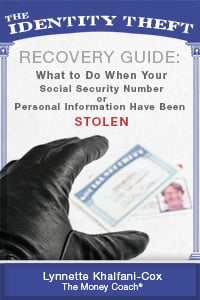Identity theft is a crime that occurs whenever one or more individuals steal someone else’s personal information for financial gain.
The stolen information could be a Social Security number, driver’s license, a credit card, bank account, or any other private data.
If you are the victim of identity theft, a crook could do any or all of these things without your knowledge or consent:
- Buy products or services with your credit cards
- Open new banking or credit accounts using your name or Social Security number. (Identity thieves often open credit cards, or get student loans, car loans, mortgages or personal loans in the names of their victims).
- Apply for a job using your Social Security number
- File an income tax return using your Social Security Number (SSN)
- Get a tax refund check from the IRS that rightfully belongs to you
Steps to Take When Someone is Using Your SSN
Take the following steps when you think someone is using your number:
- Report the issue to the Social Security Administration. Call the SSA toll-free at 1-800-772-1213 to file an official report and get a recommendation on what to do next. The SSA may determine whether they need to issue you a new number or card, or if the incident will be forwarded to law enforcement or regulatory agencies.
- Resolve credit problems by contacting the Federal Trade Commission (FTC). The FTC is dedicated to fighting back against identity theft and provides a number of resources for identity theft victims. You can call the FTC directly at 1-877-IDTHEFT and learn more about your options by reviewing the materials on the FTC Identity Theft website.

- Contact your banks and credit card companies to report the issue. Let your banks and creditors know that someone is using your card and that you are concerned about the thief having access to your accounts. The bank or credit card company may be able to put a “credit freeze” on your account until the issue has been resolved. They may also be on the alert for any suspicious activity and let you know if and when they detect something.
Identity theft affects an estimated 10 million Americans annually. To protect yourself against this growing crime, follow the advice in The Identity Theft Recovery Guide: What to do When Your Social Security Number or Personal Information Have Been Stolen.









Comments are closed.